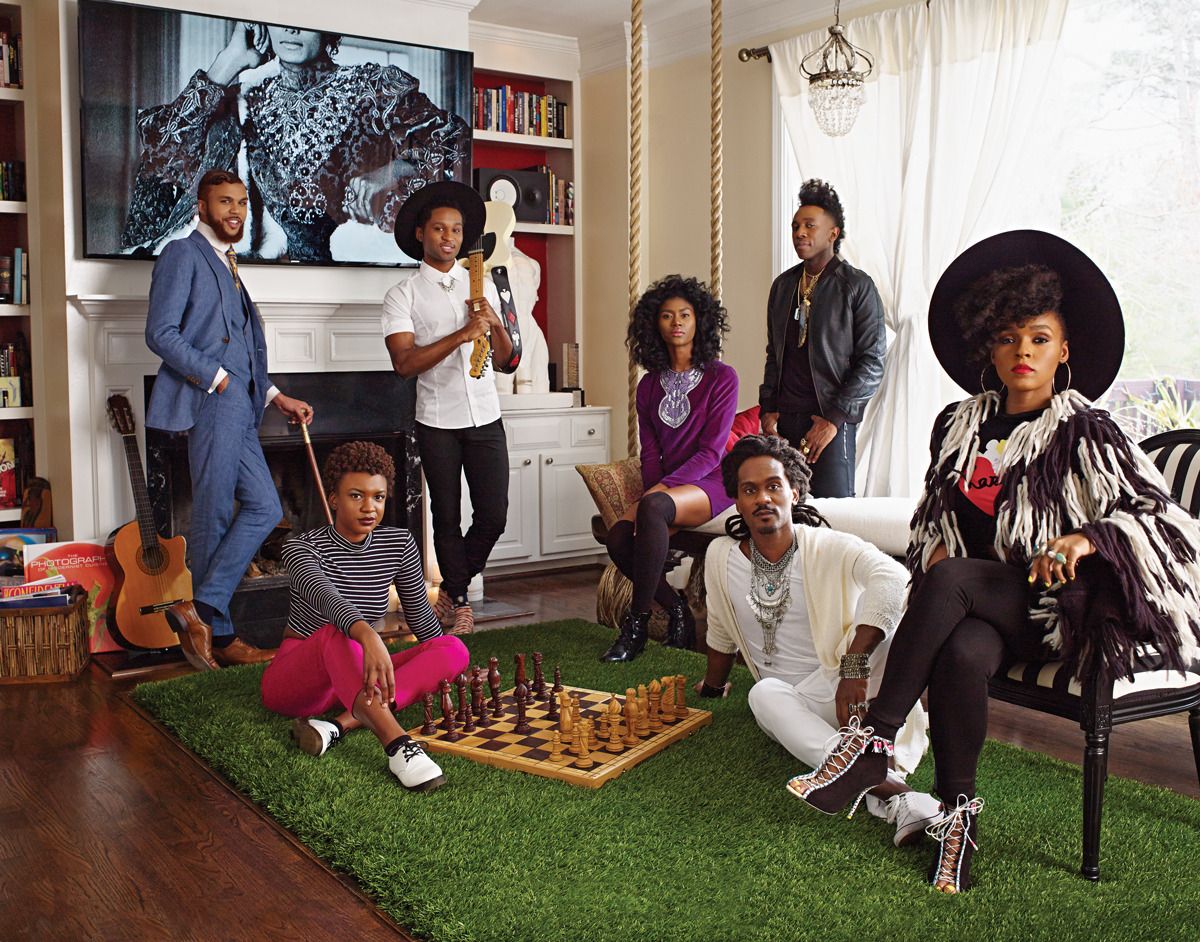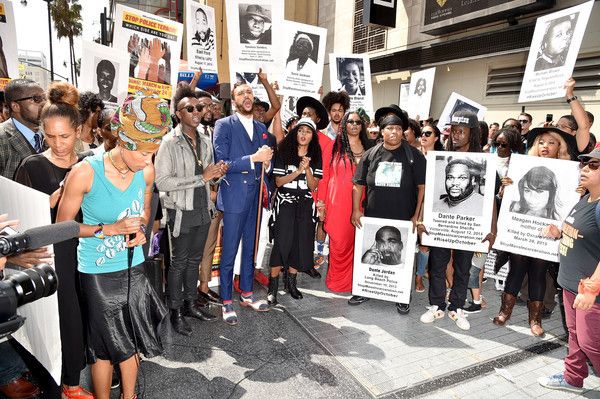The Beat of Black Feminism: Janelle Monáe and the Radical Politics of Wondaland

by Kimberly Foster (@KimberlyNFoster)
Janelle Monáe is a decidedly political artist. She’s the kind of creative voice we need. Someone whose work helps you make sense of yourself and the times. What sets her apart is not a willingness to speak but an ability to deliver multilayered analysis of complicated social issues. Since her mixtape days, she has, sonically, lyrically, and aesthetically articulated a vision for liberation.
Though she has not identified with the movement publicly, Black feminist politics undergird Monáe's persona, music, and activism. The brilliance of the work gets overlooked because she seamlessly weaves in afrofuturism to guide us toward new possibilities. Monae has won no Grammys, and her only appearance on the pop charts is as a guest on another artist’s song.
Her choice to center the peculiarities of Black womanhood obscures the dynamism of her art for most audiences. If she were a man or were her music more literal, she would undoubtedly be classed among those hailed the most influential musicians of her generation.
While the relatively remedial politics of “conscious” Black male artists who straddle the mainstream are lauded. she’s made a mark without embracing respectability or misogyny. The themes she’s explored are well beyond trite condemnations of Black-on-Black crime. Jane is next level.
And it’s important that Monáe makes these statements as an R&B artist. Laments about hip hop’s political past often evidence a tacit longing for a return of Black male leadership. Monáe is a woman in tune with the times, and she’s refuting the historic notion that true Blackness is tied to masculinity.
Janelle Monáe's career continues to soar, and she’s opted to move beyond the studio and the stage. Monáe is creeping toward the mainstream with increased visibility and corporate endorsements, but she has not lost her voice. Instead of shying away from the hard fights now that more money is on the line, she’s deliberately situating herself within them. As the head of Wondaland Records, she’s revealing a new dimension of her political life. Like the music moguls who came before her, she’s the head of her own crew. But there’s something different about Wondaland, and it starts with Monáe herself.
*******
"We are complete people."- Janelle Monae
"We are complete people."- Janelle Monae
Monáe harnesses the power of marrying popular art and Black feminism. Pop culture and mass media are prime avenues for this exploration, and Monáe continues a long tradition of Black women who have used their platforms to advance a freedom agenda. Her aesthetic harkens back to the zenith of Black feminist creative works: the 1970s.
The Black woman-ness of Monáe's politic fuels her art as well as her activism. She has always spoken specifically to her experience as a Black American woman. As a Black girl for the Black girls, she's demonstrated knowledge and empathy for our struggles. On the now defunct Queen Latifah show, Janelle tearfully thanked a fan for her support while noting the personal effect of the invisibility of Black women in mainstream media. “Never in a million years did I think I would see a young Black girl wanting to look like me,” she said.
Her visage is a highly influential one. While the revolutionary potential of women’s aesthetics are often downplayed, Monáe sends messages via how she adorns her body. Her choice to wear black and white, for example, is a nod to her working class parents and low wage workers. And her hair, hair having long been a site of political expression for Black women, remains unstraightened nearly all the time.
In the contemporary media landscape, the balance of feminist expressions is vital. Monáe's selections provide an alternative to the Get Naked and Get Money Feminism most often presented in the mainstream. But she refuses to embrace the pedestal afforded “good” Black women. Her latest single, Yoga, is a testament to her versatility. Monáe drew criticism for delivering a good old-fashioned party record with a fun-loving video to match. She shows more skin than ever, rocks obvious extensions and makes less-than-subtle sexual innuendo throughout. Her explanation for the turn? “We’re complete people.” It's a familiar response for any woman who has had to justify a good time. You can love justice and have fun.
The centering of dynamic Black womanhood sets Wondaland apart. There’s vast, untapped power in that frame. Patricia Hill Collins explains, “to put black women in the center and say that we can actually theorize and see things we cannot see from other spots remains radical.”
Monáe once assumed the role of a lonely android. Her alter egos and strict dress code underscored her alienation in a land of inequity. She admits that her life as an artist that defied entertainment industry norms took a toll telling hosts of the largely influential radio show The Breakfast Club, “I’ve been feeling alone out here.” And with Wondaland she’s moved definitively from exploring that singularity to building the community. The progression now seems natural.
*******
"We want y'all to know that Wondaland is for the people." - Janelle Monáe
"We want y'all to know that Wondaland is for the people." - Janelle Monáe
Wondaland is a world of Monáe's own imagining architected to free the masses. She makes it clear in a mini documentary about the burgeoning movement. “There’s so much going on in the world right now, and I think what we’re feeling is a responsibility to making sure that we’re equipping people with music that changes their lives for the better —that inspires them and helps them to be their highest selves and when it’s time to riot for their rights, we’re their soundtrack.”
Yes, they’re fly and funky, but they’re also fearless in critiquing systems of white supremacy. Janelle and her roster of artists, which includes Jidenna, Deep Cotton, St. Beauty, and Roman Gianarthur, released a protest song in the heat of #BlackLivesMatter and #SayHerName. Hell You Talmbout is far from perfect, but it was an undeniable show of solidarity with the current fight for Black Liberation.
This is an opportune moment to co-opt revolutionary language for commercial use, but Wondaland is ‘bout it, colloquially speaking. They’ve taken to the streets in city after city on tour to protest state violence, and along the way, they’ve linked up with grassroots activists and organizers.
Janelle, herself, shows her solidarity by disregarding her carefully crafted aesthetic for protest. While marching, she wears her hair loose and dresses in sweats and boots or tennis shoes. But no matter how she's dressed, it's always clear that she's the chief.

Photo: Kevin Winter/Getty Images North America
Wondaland aims to provide a voice that represents those silenced in mainstream discourses. Janelle Monáe's work in eradicating oppressive systems is imperative because, as Darnell Moore writes at Mic, “racial justice has often been imagined as liberation specifically for black (heterosexual) men for years.” To upset the narrative, the women who’ve always been present can no longer be relegated to background roles. Liberation not limelight is the goal, but now the women in the trenches demand to be acknowledged and credited for their labor. The days of settling for life as a movement mule are no longer. That’s the cultural shift we see in the function of Black Lives Matter.
The intersectional foundations of the Black Lives Matter movement provide an important corrective to the historical legacy of leadership in the previous movements for Black civil rights. Most noted civil rights organizations and movements had a “woman problem," and Black Lives Matter founders, Patrisse Cullors, Alicia Garza, and Opal Tometi, have been intentional about combatting their erasure.
We are witnessing the possibilities of Heroic Black female leadership wherein women are in front and not consumed with ego because the mission extends beyond self-interest. Wondaland builds upon it as Janelle Monáe and her squad partake in varied forms of activism that serve as an an ode to the cultural moment and larger movement that made her leadership possible. There is a direct line from the Black woman-led organizing of Black Lives Matter and Wondaland.
*******
"We come in peace, but we mean business." - Janelle Monáe
Clearly Janelle Monáe is the biggest name in Wondaland, but she readily shares the shine. She seems completely unthreatened by Jidenna's breakout success with his smash hit, "Classic Man"—the lead single from Wondaland's Eephus LP.
At nearly every press stop in support of the new music, she brought her artists along. But she flips the old script. The men she brings with her are not props nor is she a token. Monáe, it seems, is more concerned with getting things done than maintaining a specter of dominance. Wondaland is about their freedom business, and we see who is setting the agenda. With every press hit, Monae eschews patriarchal expectations of looking pretty in public and building in private. She's expertly leveraged her access and resources to advance the causes she finds worthy.
Janelle Monáe thrives beyond the socially prescribed roles for women in multiple realms, and her work with Wondaland reminds us that activism looks like many things. A journey to freedom necessitates new paradigms, and the power of art lies in it's ability to provide a pathway to a struggle for camaraderie and, ultimately, justice for those who might not seek it elsewhere. Monáe's deconstruction of gender, race, class and sexuality provide a lens through which the consumers of her music can challenge the inequalities they experience. She embodies theory and moves within it. With that movement it is apparent that even that which may be rooted within the academy does not belong to it exclusively. Together we fight.
Kimberly Foster is the founder and editor-in-chief of For Harriet. Email or Follow @KimberlyNFoster

No comments: